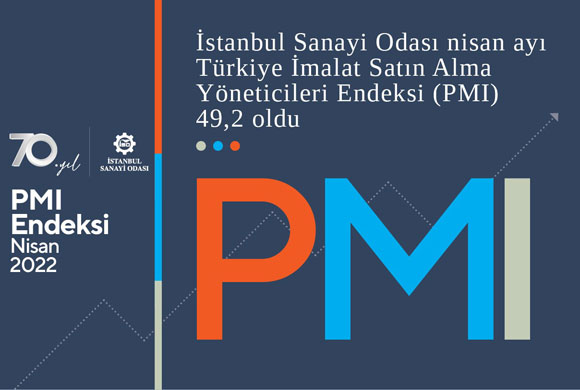News
ISO Türkiye Manufacturing PMI April 2022 Report and Türkiye Sectoral PMI Report Announced
- 05.05.2022
- News

Istanbul Chamber of Industry Türkiye Manufacturing PMI (Purchasing Managers’ Index), which is recognized as the fastest and most reliable reference in manufacturing industry performance, the leading indicator of economic growth, registered 49.2 in April, slightly down from 49.4 in March and indicating a second successive monthly moderation in the health of the sector. Manufacturing production slowed for the fifth month running, though to a lesser extent than in March. A lack of demand, price pressures and the war in Ukraine were all reportedly factors leading to a scaling back of output.
According to the April report of Istanbul Chamber of Industry Türkiye Sector PMI, only four out of 10 monitored sectors increased their output. But it is the highest figure since November last year. While production in wood and paper products and electrical and electronic products rebounded, the strongest growth was seen in clothing and leather products. The sharpest slowdown was in the non-metallic mineral products.
The April 2022 period of Istanbul Chamber of Industry (ISO) Türkiye Manufacturing PMI (Purchasing Managers’ Index) survey, which is the fastest and most reliable reference accepted in manufacturing industry performance of the economic growth, was announced. According to the survey results, where any figure greater than 50.0 indicates overall improvement of the sector, the headline PMI registered 49.2 in April, down fractionally from 49.4 in March and indicating a second successive monthly moderation in the health of the sector. Manufacturing production slowed for the fifth month running, though to a lesser extent than in March. A lack of demand, price pressures and the war in Ukraine were all reportedly factors leading to a scaling back of output.
Fragile demand was highlighted by a further easing of new orders as firms reported difficulties securing new business amid rising prices. New orders moderated for the seventh month in a row, while new export business slowed for the first time since January.
Cost pressures remained pronounced in April, although the rate of input price inflation eased for the fourth successive month to the softest since last September. Exchange rate weakness and the war in Ukraine were the main factors causing higher cost burdens, according to respondents, with oil, natural gas and sea transportation all reportedly up in price. In turn, manufacturers raised their output charges markedly again.
Suppliers’ delivery times lengthened due to widespread reports of difficulties securing raw materials. Although still sharp, the latest lengthening of lead times was the least pronounced in seven months. Difficulties sourcing materials, rising costs and fragile demand contributed to the scaling back of purchasing activity and inventories of both purchases and finished goods in April.
On a more positive note, firms continued to expand their operating capacity by increasing employment for the twenty-third successive month. The rate of job creation was modest, but slightly faster than that seen in March.
Commenting on the Istanbul Chamber of Industry Türkiye Manufacturing PMI survey data, Andrew Harker, Economics Director at S&P Global, said:
"The business climate facing manufacturers in Türkiye was challenging again in April as price pressures remained elevated and supply-chain disruption continued. The war in Ukraine added to these issues and also affected exports which softened for the first time in three months. That said, both cost pressures and supplier delays were at the least pronounced since September last year, providing some hope that conditions will become more conducive to growth as this quarter progresses.”
Rise in Output in four of the monitored 10 sectors
The Istanbul Chamber of Industry Türkiye Sector PMI report for April pointed improvement in some of the indicators in the first month of the second quarter, despite the ongoing difficult market conditions in the manufacturing sector. In addition to the signs of softening in inflationary pressures, the lengthening trend in suppliers’ delivery times turned into a moderate trend in some of the sectors. Increased job creation in the majority of the sectors remained one of the most positive aspects of the survey.
In April, only four out of the 10 monitored sectors increased their output. But it is at its highest since November last year. Production in the wood and paper products sector and in electrical and electronic products recovered, with the strongest growth in clothing and leather products. Land and sea vehicle output continued to rise in April. The sharpest slowdown was in non-metallic mineral products.
In most of the 10 monitored sectors, new orders lost momentum, with the most significant drop being in machinery and metal products. New orders from the electrical and electronic products sector saw a strong recovery, the highest since June 2020.
In April, supply chains sowed signs of improvement. In some sectors, the upward trend of delivery times was replaced by a horizontal trend, while the others had a more moderate rise than in March. Wood and paper products, as well as the electrical and electronic products sectors witnessed much more limited delays than the previous month.
Similarly, inflationary pressures generally eased at the beginning of the second quarter. In seven sectors, the rise in input costs slowed down, while the finished good prices dropped. The fastest rise in both indicators was registered in the non-metallic mineral products sector.
While job creation in most of the sectors continued to rise, the strongest rise was seen in land and sea vehicles. However, purchasing activities were increased in only two sectors — land and sea vehicles and clothing and leather products.
Growth in input purchases again in Clothing and Leather products resulted in the strongest increase in the sector's input stocks since the survey's beginning in January 2016. Pre-manufacturing inventories saw increase in only three sectors. But this number is the highest since September last year.
You can find attached the Istanbul Chamber of Industry Türkiye Manufacturing PMI and Sector PMI April 2022 reports.